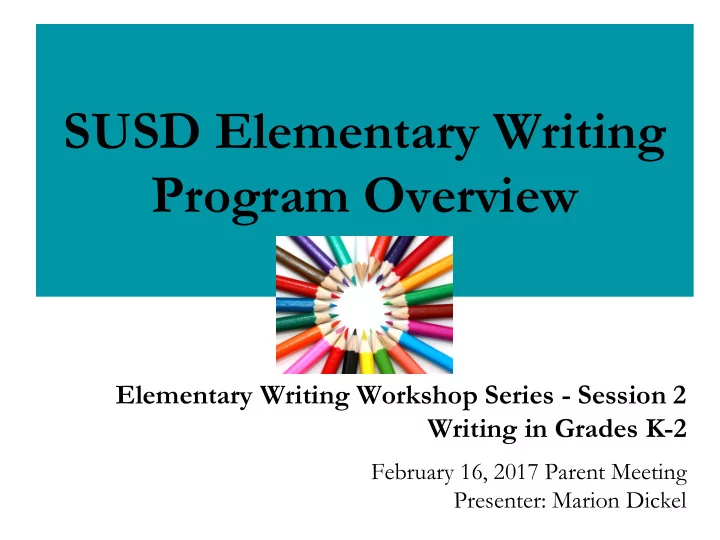

SUSD Elementary Writing Program Overview Elementary Writing Workshop Series - Session 2 Writing in Grades K-2 February 16, 2017 Parent Meeting Presenter: Marion Dickel
Objectives • Understand what writing workshop looks like in our K-2 classrooms • Understand ways parents can help their children grow as writers 2
Why Write? There are as many reasons to write as there are writers. Writing is thinking. To write well is to think clearly. ― David McCullough 3
District Writing Goals All students will master or exceed their grade-level CA Common Core writing standards. 1. Write Narrative , Informative , and Opinion pieces 2. Write with help and support from adults and peers 3. Write using appropriate tools , including digital tools 4. Write based on shared research or personal experiences 5. Write routinely over long and short periods for a variety of purposes , audiences and tasks 4
Why Writing Workshop? • Students need direct instruction in writing skills and strategies and the opportunity to practice them. • To grow as writers, students need to write often and long . • Students progress at different rates and need instruction based on their strengths. • Student choice as to what to write results in motivation and in intense, purposeful writing. 5
Teachers College Reading and Writing Project Units of Study A Writing Workshop Curriculum 6
Writing Workshop Format Component Time Mini-lesson 10 minutes Independent Writing Time 20-30 ● Teacher conferences minutes ● Small group instruction ● Mid-lesson teaching point(s) Sharing 5-10 minutes 7
Lucy Calkins: Why Mini-lessons 8
Mini-lesson • Whole class instruction - the teacher provides explicit instruction of a writing skill or strategy • Short - approximately 10 minutes • Consistent structure – Connection – Teaching – Active Engagement – Link
Independent Writing Time • Students work on self-selected topics within a unit of study. • Students spend their time somewhere in the writing process : planning, drafting, revising, editing, or publishing. • Students are at various stages in the writing process. • Teacher confers with students individually or in small groups to meet individual needs. • Students do not publish everything they write. 10
Conferring • During independent writing time • Teacher confers with individual students • Consistent structure – Teacher quickly assesses student’s goals - what the student is intending to do and has done – Based on assessment and conferring notes, the teacher teaches the next step - a needed skill or strategy (Learning Progressions) – Guided practice – Student returns to writing 11
Conferring: Writing True Stories Across the Pages 12
Learning Progressions • Used for each genre (narrative, information, opinion) • Describe grade-level expectations for each component of writing – Overall – Lead – Transitions – Ending – Organization – Elaboration – Craft – Spelling – Punctuation • Common Core aligned 13
Learning Progressions example 14
Checklists 1. Overall 2. Lead 3. Transitions 4. Ending 5. Organization 6. Elaboration 7. Craft 8. Spelling 9. Punctuation 15
Checklists - Craft K 1 2 16
Sharing • At the end of workshop • Teacher reinforces a skill or prompts students to think about a new one. • Students share their work or ideas in a whole group or with partners. 17
Publishing • Students do not publish all of their work – The focus is on the process, not the final product. – The goal is for students to have many opportunities to practice each genre, NOT to create one perfect piece. • Some publishing possibilities (there are many more): – Class books or anthologies – Partner sharing (in person, online) – Publishing party – Author’s Chair – Presentations and Debates 18
How can parents help? 19
Develop independent writers 20
21
22
Tracking Growth • Student Self-Assessment and Peer Assessment with Learning Progressions and Checklists • Rubrics • Classroom Performance and Daily Work • Conferring Notes • Published Writing • Benchmark Assessments (pre- and post- unit) 23
Resources • This presentation is available on the district website under Educational Services • Upcoming Sessions: – Session 3: Writing in Grades 3-5 Tuesday, February 28, 9-10 AM, Saratoga Elementary MPR • Parents as Writing Partners • mdickel@saratogausd.org 24
Questions 25
Recommend
More recommend